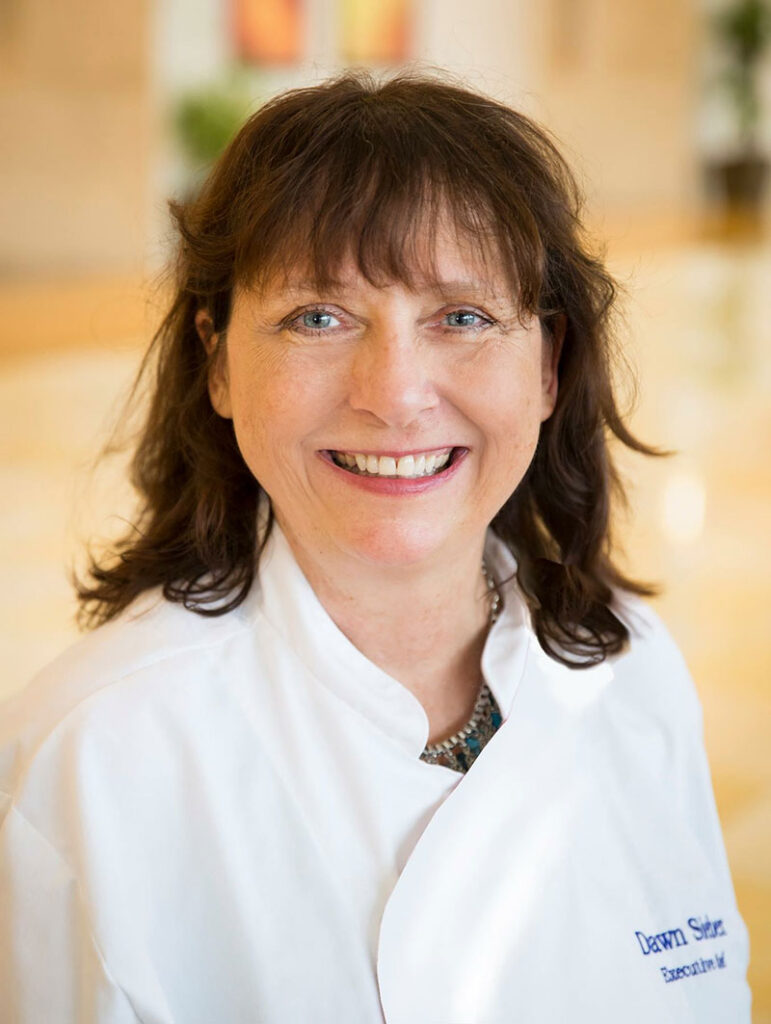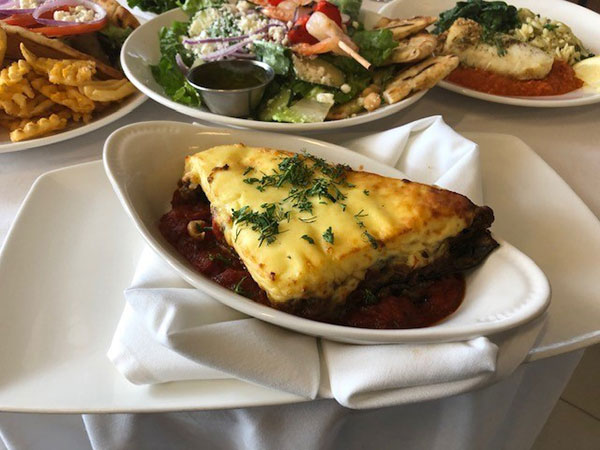Purdue offers the perfect blend of ingredients for HTM chef Dawn Sieber
Written By: Rebecca Hoffa, rhoffa@purdue.edu

Coming from a family of mostly doctors and lawyers, chef Dawn Sieber took off in a new direction as she followed her passion in the culinary arts. From the moment she was first introduced to cooking, she knew she’d found her path.
“I loved to cook from the time I was in my second-grade home ec class, and I still remember the teacher, Mrs. Martin.” Sieber said. “I told my mom I wanted to cook, and that was the beginning.”
As the first female clinical professional instructor and chef instructor for Purdue University’s School of Hospitality and Tourism Management (HTM), Sieber has found her perfect fit. In her blended position, Sieber is responsible for departmental operations, such as ordering, purchasing, and overseeing staff and catering, as well as teaching one-credit-hour culinary classes in Marriott Hall that allow students to experience working in a full-service kitchen.
“I get to exercise all of the best parts,” Sieber said. “I get to teach. I get to still be involved in food preparation and creating menus. It’s such an interesting blend of skill sets.”
Sieber has a diverse background in culinary arts, from working as the executive chef of the Cheeca Lodge in the Florida Keys to opening the Asian cuisine restaurant Kaiyo to implementing a five-star approach to serving patients and families at Mayo Clinic. Throughout her experiences and the many recipes she’s prepared, Sieber has found Japanese cuisine to be one of her favorites. This includes sushi as well as other dishes like duck with soba noodles, a variant of which will be featured on one of the John Purdue Room’s spring menus.
“It’s about respect and dignity and treating the food like that, as much as it is an art form,” Sieber explained. “I love the pure simplicity of the ingredients.”
Sieber first made the transition into culinary education when she joined The Art Institute of Jacksonville, Florida, as an adjunct lecturer and later as a full-time instructor. The program taught chefs like Sieber how to teach and inspired her to earn her master’s degree in education from Argosy University.
Sieber brought a student-centered and health-conscious approach to Purdue, and when coming up with new menus and recipes, she is focused on student learning and keeping foods vegetable-forward.
“For me, I’ve always had a garden and been involved with the farm-to-table movement, before they even called it that,” Sieber said, noting that she has many fresh resources available to her at Purdue. “That drives me, putting more vegetables on plates.”
In her experience at Mayo Clinic, Sieber was influenced to think of nutrition in a new way than she previously had with her restaurants by focusing on the special dietary needs of the patients, and she’s translated that experience to Purdue HTM’s dining and catering as well.
“More and more, people are gluten-free or dairy-free or meat-free, and they want options that taste just as good as any other food that’s being eaten, and they deserve to have that,” Sieber said.
For example, she noted that March’s Greek-inspired menu in the John Purdue Room has made these kinds of adjustments, such as developing a vegetarian Greek moussaka using Impossible plant-based meat.

As an instructor, Sieber has faced the difficulties of the pandemic head-on. In teaching a course that relies on hands-on learning in the kitchen, she said it was important to adapt the learning labs in Marriott Hall to Protect Purdue protocol while still finding a way to meet in-person. In doing so, Sieber and others mapped out a way to limit seating capacity for social distancing in the John Purdue Room and offer a limited menu that rotated every two weeks to a new global cuisine to keep students engaged.
“We worked very, very hard to figure out how to do this and be here with our students because this is not something that could be taught online,” Sieber said.
Through her classes, Sieber is instilling hospitality skills in her students that can be applied to a variety of careers — not just culinary arts. Her classes focus on the kitchen systems, processes, teamwork and professionalism to demystify food service and the hospitality industry.
“It’s not just about the cooking,” Sieber said. “It’s about learning how to operate a fully functional kitchen.”
During her time as a chef and instructor, Sieber said the professionalism she’s seen from the students sets the University apart, and she noted that she enjoys being able to mentor them and watch them grow and learn about themselves in the program.
“I am so impressed with the students,” Sieber said. “I have never met people like them. Being in a research university where you have such a collaborative faculty and the depth of the program, the combination is extremely interesting. It’s really nice that people fully embrace education here.”
During the spring semester, the Marriot Hall dining locations are open as follows:
- The John Purdue Room is open 11:30 a.m. to 1 p.m. Tuesday-Friday and will close for the summer.
- The Boiler Bistro is open 11 a.m. to 1:30 p.m. Monday-Friday and will close for the summer.
- The LavAzza Café is open 8 a.m. to 4 p.m. Monday-Friday and will operate with revised summer hours, 8 a.m. to 3 p.m.